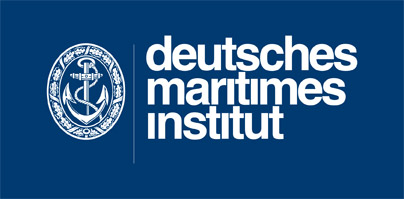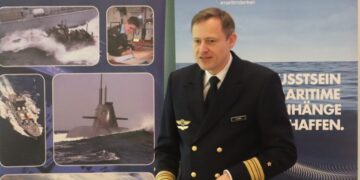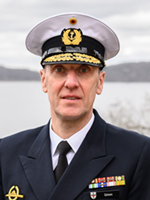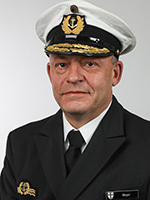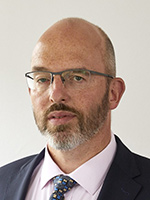Mission
The German Maritime Institute (DMI) is the centre for maritime expertise and education in Germany. For almost half a century, we have been promoting understanding of maritime issues by combining expertise from the fields of politics, science, business and the navy. The specialist magazine 'marineforum' published by the DMI, the online news portal and our specialist events form the platform for this exchange. Our aim is to gain institutions and companies as supporting members who will support our mission and further advance Germany's maritime orientation.
Vision
Germany plays a central role in the global economy and at the same time bears a crucial maritime responsibility. The DMI's vision is a broadly informed and committed society that recognises the importance of the maritime sector for our prosperity and security.
News from the DMI
Germany is not "not affected"
In the third edition of its "Institute Plenum", the German Maritime Institute once again posed a topical question on the security policy situation
Maritime Convention 2024, Berlin - More globally relevant than ever
The 17th edition of the Maritime Convention 2024 in Berlin took place in the shadow of several political events. The format is ...
Events organised by the German Maritime Institute 2025
28 June 2025 - Sail Out Kieler Woche, Presentation of the DMI
01 July 2025 - 2.Bremen dialogue "Maritime Security and Navy 2035+ AI & Autonomy - Future of Maritime Security", participation by invitation only
15-17 July 2025 - Maritime study trip to the Baltic Sea, joint event of the Maritime Capital Forum, participation by invitation only
10-11 October 2025 - Big Bang AI Festival in Berlin, Prior registration required
11 November 2025 - Maritime Convention at the LV SH in Berlin "The Security of the Peninsula Europe Continental & Maritime", participation by invitation only
25 November 2025 - MS&D (interim) in Hamburg, participation by invitation only
Marine, politics, science and business
Forum for discussion and exchange of ideas on maritime issues
The German Maritime Institute (DMI) analyses maritime events and developments that have an impact on policy and strategy. Germany is one of the world's leading nations in industry, exports and logistics. Prosperity and jobs throughout the country depend on this. It is important to emphasise the ties that result from Germany's dependence on the sea and its trade routes. Germany's economic strength is a prerequisite for it to be able to fulfil its role as a leading nation and crisis manager in Europe. It is not at the expense of other nations, but is based on global exchange for mutual benefit.
The German economy imports the majority of the raw materials it needs by sea and exports its globally sought-after "Made in Germany" products in the same way. 60 per cent of our foreign trade goes this way. Container gantry cranes in the harbour have long since replaced smoking chimneys as the background image for business news in the press and on television. They symbolise the importance of the maritime sector for global trade and a flourishing economy.
However, this does not mean that businesses and citizens have internalised the opportunities and risks arising from the use of the sea. For example, the general public is hardly aware that transport via waterways, whether inland or between continents, protects the environment and relieves road congestion. At the same time, public awareness of the dangers at sea is only sporadic. When pirates attack a ship, for example, there is a brief, often lurid echo in the press, which soon dies down again without the context and consequences being explained in more detail.
Risks and opportunities can be translated into cost increases or savings, into competitive obstacles or advantages. This affects the entire economy, not just shipping and the coast. Every German job - and therefore our prosperity - is directly or indirectly linked to the sea and sea routes.
the lake. Or: No bananas today.
the lake.
Or: No bananas today.
"The DMI is currently supported by around 200 members ..."
Founded in 1973 as the German Marine Institute, the DMI has been representing maritime issues in the public arena for almost 50 years. Since then, the focus of its work has shifted from defence at sea to general issues of maritime security in times of globalisation.
The Institute, a non-profit registered association based in Wilhelmshaven, is an association of personal and supporting members. It is supported by personalities from politics, science, business and the navy who are interested in maritime issues beyond their specialist tasks and want to help shape them. The DMI is currently supported by around 200 members who contribute their expertise to the institute in the fields of maritime security, the German Navy, global maritime logistics, shipping, shipbuilding, maritime law, naval forces and other maritime topics.
President, DMI
Karsten Schneider, Rear Admiral (ret.)
"The DMI has set itself the task of promoting awareness of maritime issues."
The DMI has set itself the task of promoting awareness of maritime issues. To this end, a large number of initiatives have been launched in recent decades. The DMI was the initiator and active promoter of the first internet portal for the maritime sector, the "German Maritime Competence Network (DMKN)" and operator of the German-language blog "Meer verstehen". It is a founder and member of the steering committee of the Maritime Capital Forum (MHF), a joint event platform of maritime associations and institutions that promote dialogue between experts, interested parties and stakeholders in Berlin. Last but not least, the DMI is the publisher of the specialist journal "marineforum" and numerous scientific publications.
The DMI has extensive experience as an organiser of maritime seminars and conferences, with which it addresses politicians, the press and the public. It also represents maritime topics with its experts at specialised seminars and workshops. It organises several conference series for German-speaking countries, including the "Maritime Convention" in cooperation with "griephan Briefe", which is aimed at political decision-makers every year in Berlin.
Chairman of the Board of Directors, DMI
Jens Grimm, Flotilla Admiral
safe sea routes.
safe sea routes.
DMI Presidium
The Presidium is a body of personalities who are responsible for contributing to the achievement of the Institute's objectives in an overarching manner through guidelines and recommendations. The Presidium consists of a President, a Vice-President, the Chairmen of the Naval Officers' Association, the German Maritime Institute and up to 6 other members of the Executive Committee.

President
Rear Admiral (ret.) Karsten Schneider
Vita
- 1974 Joined the German Armed Forces, Crew VII/74
- 1975 Studied economics and organisational sciences
- 1979 Officer of the watch in the 5th speedboat squadron
- 1982 Exchange officer in the US Navy
- 1985 Commander of the speedboat S-59 REIHER
- 1987 Adjutant to the Commander of the Fleet
- 1989 Frigate BREMEN
- 1991 Admiral staff training
- 1993 Advisor in the Federal Chancellery
- 1995 Commander of the frigate LÜBECK
- 1997 Consultant at the Federal Ministry of Defence (Fü S III 3, NATO)
- 1999 Consultant in the Secretariat of the Commission "Common Security and Future of the Bundeswehr" (Weizsäcker Commission)
- 2000 Head of department in the BMVg planning staff (personnel, internal command, training)
- 2002 Commander of the 4th Frigate Squadron, 2003 Commander of the Franco-German Naval Organisation
- 2005 Head of Division at the Federal Ministry of Defence (Division M III 1, Conception and International Relations)
- 2008 Head of Division at the Federal Ministry of Defence (Fü S VI 2, Conception of the Bundeswehr, Transformation)
- 2012 Head of Division at the Federal Ministry of Defence (Plg I 1, Concept and Target Formation)
- 2012 Deputy Commander and Director Courses/Training - Bundeswehr Command and Staff College - Hamburg
- 2018 Chief of Staff at the Naval Command - Rostock
- 2020 Retirement
- June 2021 President of the GERMAN MARITIME INSTITUTE e.V.

Vice President
Dr Sarah Kirchberger
Vita
- 1999 M.A. in Sinology, Political Science and Pre- and Early History, University of Hamburg
- 2000 Research Assistant, Politics of East Asia, University of Trier
- 2004 Dr phil. in Sinology, University of Hamburg
- 2007 Analyst in the strategic marketing department, TKMS Blohm + Voss
- 2010 Junior professor for contemporary China, University of Hamburg
- 2017 to 2023 Head of the Department of Strategic Development in Asia-Pacific, Institute for Security Policy at Kiel University (ISPK)
- since 2020 Vice President of the German Maritime Institute e.V.
- since 2021 Nonresident Senior Fellow, Atlantic Council
- since 2023 Director, Institute for Security Policy at Kiel University (ISPK)
DMI Board of Directors
The full Board of Directors is responsible for the organisational and administrative management of the Institute. It is responsible for the organisation and implementation of all measures necessary to achieve the statutory objectives of the Institute. It appoints the President of the German Maritime Institute directly.
The entire Board of Directors is elected by the Annual General Meeting for a term of office of at least one year. The current term of office is 2 years.
Vita
- 1989 Joined the navy
- 1989 - 1991 Civil professionally recognised vocational training as a mechanical engineer
- 1991 - 1994 Service as engine mate on the minesweeper "Wolfsburg"
- 1994 Officer training Crew VII/94 Naval Academy Mürwik, Flensburg
- 1994 - 1997 Training as watch officer on submarines
- 1997 - 2004 Service as watch officer on submarines and commander on U30
- 2004 - 2006 Nautical studies at the Elsfleth University of Applied Sciences
- 2006 - 2008 Head of operational training at the submarine training centre
- 2008 - 2011 Head of Human Resources and Deputy Head of Department at the Bundeswehr Headquarters
- 2011 - 2012 Participation in the 50th General Staff/Admiral Staff Service International course at the German Armed Forces Command and Staff College in Hamburg
- 2012 Head of the Underwater Warfare Division on the staff of Operational Flotilla 1 in Kiel
- 2012 - 2013 Commander of the Submarine Training Centre (AZU)
- 2013 - 2015 Commander 1st Submarine Squadron
- 2014 Contingent Commander German contingent in Lebanon UNIFIL
- 2015 Consultant at the Federal Ministry of Defence, Armed Forces Command and Control Division II 1
- 2015 - 2016 Advisor at the Federal Ministry of Defence, Armed Forces Command and Control Division III 1
- 2016 - 2018 Advisor to the Parliamentary State Secretary at the Federal Ministry of Defence
- 2018 Officer Naval Command, Planning/Concept Department (Development of Framework Nation Submarines)
- 2018 Adjutant to the Inspector General of the Bundeswehr
- 2021 - 2024 Commander of the Naval Operations School Bremerhaven
- 2024 Head of Division in the Planning and Command Staff at the BMVg
- 2025 Commander of the Mürwik Naval Academy

Deputy Chairman
Rear Admiral (ret.)
Thorsten Kähler
Vita
Former Rear Admiral (KAdm) Thorsten Kähler has been the Deputy Chairman of the DMI since 9 October 2021 as Chairman of the Naval Officers' Association in accordance with Section 10 of the DMI statutes.
KAdm a.D. Kähler belongs to the crew 07/73. His first officer assignments were in the submarine flotilla. Following his admiral staff training, he was commander of the frigate BAYERN, served as a consultant in the Federal Ministry of Defence (BMVg) and commanded the 6th frigate squadron in Wilhelmshaven. After his assignment at the International Military Staff at NATO Headquarters in Brussels, retired KAdm Kähler was Deputy Head of the Planning Staff at the BMVg, Commander of Operational Flotilla 2 and Sub-Division Head I in the Political Affairs Division at the BMVg. Most recently, he was Chief of Staff at the Naval Command in Rostock until his retirement in 2018.
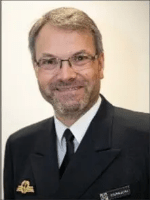
Assessor
Flotilla Admiral
Dipl. Ing. Andreas Czerwinski

Assessor
Heinz Schulte

Assessor
Lieutenant Captain d.R.
Ulf Jensen

Assessor
Rolf Neumann

Assessor
Frigate captain
Dirk Peters

Assessor
Retired staff captain lieutenant
Werner Schiebert
DMI Managing Director

Managing Director
Retired staff captain lieutenant
Karl-Hubert Brüdegam
Vita
SINCE 1973.
Membership, statutes and contact
The intellectual and spiritual work of the German Maritime Institute is supported by its members, who can be natural persons, groups of persons or legal entities and are invited to become members by the Board of Directors. Since 1973, personalities from the ranks of naval officers, science, politics, business and industry have come together, all of whom have undertaken to either provide practical support for the projects of the German Maritime Institute, to contribute to specialist scientific studies on maritime topics or to donate the necessary funds or organise donations.
The Annual General Meeting decides on the annual, business and financial reports as well as on the discharge, election and motions of the Executive Board.
 Articles of Association
Articles of Association
DEUTSCHES MARITIMES INSTITUT e.V. (DMI)
Jadeallee 102, 26382 Wilhelmshaven
Tel. (04421) 50047-20
e-mail [email protected]
Entry in the register of associations at Oldenburg Local Court under the number VR 202315
Responsible persons
President Rear Admiral (ret.) Karsten Schneider
Chairman of the Board of Directors
Flotilla Admiral Jens Grimm
Responsible for content according to §10 Abs. 3 MDStV:
Managing Director Karl-Hubert Brüdegam
German Maritime
Institute e.V. (DMI)
Jade avenue 102
26382 Wilhelmshaven
Phone: +49 (0) 4421 - 50047 20
E-mail: [email protected]
Volksbank Wilhelmshaven eG
IBAN: DE50 2829 0063 1100 3967 93
BIC: GENODEF1WHV


